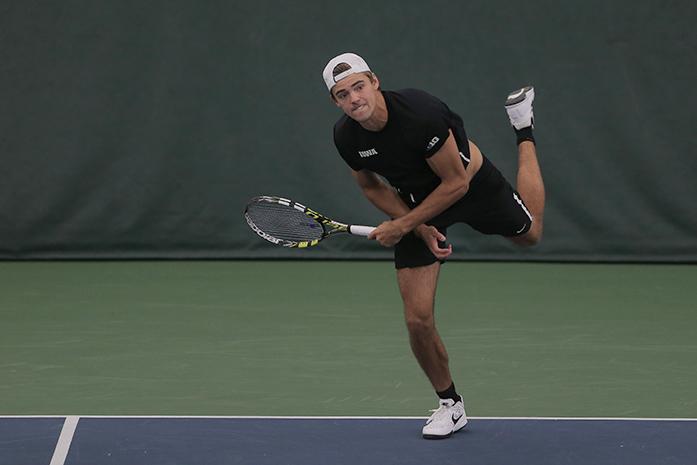By Pete Ruden
peter-ruden@uiowa.edu
In a sport such as tennis, mental toughness makes all the difference.
It can be the difference in winning a clutch point. It can be the difference in winning a close set. It can be the difference in winning a close match and closing the book on a tournament victory.
That’s why the Iowa men’s tennis team knows its importance.
“I would say tennis is probably one of the most mentally challenging sports,” senior Nils Hallestrand said. “You’re all by yourself out there. Being mentally tough is incredibly important … You could be the most talented player ever, but then go out in a match and just not be able to put it together mentally, and you can’t be successful that way.”
Being one of two seniors on the team and having experience playing tennis at the Division-1 level, Hallestrand knows the benefits of being mentally tough. Playing any sport for four years at a high level will teach an athlete what is important and how to improve as the years go on.
Hallestrand said that players have to have mindsets in which they are focused on getting better for a reason. He said that going through the motions won’t help anyone on the team, physically or mentally.
“[A good mindset] can do so much,” he said. “If you go into the practice with the purpose of getting better and actually thinking about that purpose, you’ll for sure become a lot better quickly, as opposed to going into practice with a negative mindset and just going through the motions.”
While tennis is a very physical sport with a lot of running, it is also extremely mental. A student-athlete playing tennis at the college level is expected to be in shape, but being mentally tough — though definitely important — isn’t something that will show up in a scouting report.
Junior Jake Jacoby thinks tennis is even more mental than physical. He said it is in clutch moments in which an athlete’s mental toughness will really show. If athletes tighten up and are unable to perform when the pressure is highest, they weren’t mentally prepared for the moment.
The Hawkeyes have been working on their mental toughness through playing matches in tournaments and doing something competitive in practice every day.
Jacoby said playing in drills is different than playing in matches. While everyone can play up to their potential in a drill, it’s important to step up to the plate when points are being kept.
“We don’t go a day in practice without doing something competitive,” Jacoby said. “… We don’t go a day where we just drill, because everyone can play well in drills, it’s a totally different thing when people are counting points, so every day we’re practicing.”
In the Big Ten, it is extremely important to be mentally tough. Many of the schools in the conference are among the best in the country, and the players are, naturally, good.
When competing against some of the best tennis players in the country, having an advantage mentally could help win matches.
“At this level, in Division-1 [in] the Big Ten, every week you play some teams [where] almost all of them are ranked,” Jacoby said. “At this point we can play a really high level of tennis, so if you can have a mental edge, it gives you way more chance to win a match.”



